- Home
- Sam Siciliano
The Angel of the Opera Page 11
The Angel of the Opera Read online
Page 11
Because most of the lamps had been extinguished on our former visits, I had never noticed their abundance; but that night gas flames flared everywhere, brilliant behind glass. A multitude of bronze sculptures held torches mounted with lamps, and when I looked overhead, I could see more lights as high as the fifth balcony, the last before the dome.
The main foyer was less crowded, and we made our way directly to our box. The floor underfoot was an elaborately designed mosaic of colored pieces. Holmes noticed me staring downward. “Venetian. The same Italian craftsmen worked on the ceiling mosaics in the advance foyer. And these doors, I believe, are cherry wood. Notice the glass windows shaped like portholes. The nautical effect is probably unintentional.”
Holmes closed the door behind us and drew a curtain across the round window, hiding us from the foyer. The interior of our box was red velvet and gold, the same two colors predominant in the auditorium before us. My eyes followed the vertical lines of the tall gilded pillars converging upward at the dome high above. The great chandelier was aflame, all gold and sparkling crystal. Heroic figures were painted on the dome itself, various deities in the act of ascending into the heavens.
“It is a most imposing theater,” I said. “Covent Garden does seem second rate in comparison.”
Holmes pulled off a white glove. “Only if you put the emphasis in the wrong place–the architecture before the music. Great music does not depend upon the opulence of the auditorium and the spectators for its power. It should not surprise you that the most accomplished violinist I have ever heard played in a wintry graveyard. All this”—his upturned hand swept about in a curve—“is mere distraction. However, most of the spectators would willingly admit that they come here to see and be seen, rather than to listen. That is the real reason why the chandelier is not extinguished during the performance. One might be forced to regard the stage rather than one’s neighbors. I hope some day they will follow Bayreuth’s worthy example and leave the audience in darkness.”
“Speaking of neighbors,” I said, “do you see the de Chagnys?” Their box was on the first tier not far from ours. The Count sat back slightly from the railing, his expression cold. The Viscount’s face showed only slightly more color than his white shirt, and his reddish brown hair was an unruly mass of curls. “The Viscount looks the part.”
“Which part?” Holmes asked.
“The romantic lover alone and palely loitering.”
“His brother plays a similar part.”
“How so?” I inquired.
“Romantic pining and cynical debauchery are opposite sides of the same coin. One views women as impossibly good, the other as impossibly bad. It would also explain the Viscount’s sudden turns of mood. One moment Christine Daaé is an angel, the next she is a harlot ready to run off with another man.”
I nodded. “And you–how do you view women?”
“I fear I have seen more trollops than angels, but finding a worthy man is also a difficult quest. Diogenes was not the last to have a hard time of it. This topic interests you, Henry.”
I hesitated. “I have been thinking of Michelle a good deal lately.”
“Why do you not marry her and be done with it? She has twice the spirit and brains of any of the other women you have courted.”
“Do you think so?”
“I do. You are nearly thirty, past the age when a man should still be looking at women with his eyes full of moonshine or calculation. If you like the lady and she will have you, then take her.”
I smiled. “Strange words to be coming from you.”
He gazed out at the crowd. “I have no time for the great chase. My work occupies me, and I would not wish my eccentricities upon any member of the fair sex.”
“I know of at least one who would willingly tolerate them.”
His face stiffened. “You approach forbidden ground, Henry.”
I hesitated again. “Michelle may not... There have been other men before me.”
“Given her age, that is hardly surprising. Have you avoided all women during the same interval?”
My face felt flushed. “That is... different.”
He gave a short sharp laugh. “You know better. Youthful indiscretions of one kind or another are common; my business has made that all too clear. The question is whether she–and you yourself–will be faithful now. Trust your heart, Henry.”
“I cannot believe that you of all people are telling me this.”
“Forget who is speaking. Do, however, avoid the extremes of the two de Chagnys.” He sat back and withdrew a pair of opera glasses from his coat pocket. “The orchestra is in the pit. The performance should be starting any moment now. It is rather amusing, I must admit, to hear me pontificating upon the subject of women. Be assured that I am your cousin and your friend.”
“And a very good friend!” I exclaimed. “I only wish that you would not shut yourself away from that intimacy, that solace, which you counsel me to take.”
The corners of his mouth twitched. A strand of oily black hair fell across his forehead, and he thrust it back. His gray eyes on either side of the great nose glowed. “Not for me, Henry. Not for me.”
“Why? Miss Lowell...”
“Here is the conductor. You will see now that the audience at the Paris Opera is not capable of genuine silence; a low buzz is the best we can hope for.”
That night, however, there was an expectant hush before the music began. The crowd might not be aware of the Phantom’s threat, but they knew about the rivalry between Carlotta and Christine Daaé. And who knew what bizarre rumors had circulated involving the ghost? Holmes pointed to our right, and I saw Moncharmin and Richard alone in what must be Box Five. Richard seemed content, while Moncharmin obviously wished to be elsewhere.
Faust has its moments, the music occasionally rising above the treacly plot. Mephistopheles, the basso devil, is a far better part than those of the fatuous tenor hero or soprano heroine. Since Marguerite did not appear until well into the opera, we had a long wait before us. The first scene had only the two men, the aged Faust agreeing to trade his soul to the devil in return for youth and love (represented in this case by the not so alluring vision of Carlotta at her spinning wheel behind a scrim downstage right). Mephistopheles made a spectacular entrance amidst a burst of smoke illuminated by one of Monsieur du Bœuf’s sinister orange limelights.
The second scene had several rousing choruses, Valentin’s farewell aria, and Mephistopheles’ ‘Le Veau d’Or’. A murmur went through the crowd when Christine Daaé entered early in the scene. A few of the more zealous members of Carlotta’s claque actually hissed, and you could see that Daaé was shaken.
Siebel is one of the so-called trouser roles, but any fool could tell that Christine Daaé was a small pretty girl in a man’s costume. (I was also skeptical a man would wear powder blue tights and doublet.) Valentin was a good foot taller than Siebel, and his entrusting the safety of his absent sister Marguerite (the massive Carlotta) to Siebel (petite Christine) was inadvertently comical. Christine was the one who needed protection! Her singing was competent, but somewhat listless. She sounded tired.
At last the students and young village girls entered, including Marguerite. Carlotta’s enthusiasts applauded wildly, and she gave them a gracious nod. Perhaps I lack some aesthetic faculty, but I simply could not get beyond Carlotta’s appearance, age, and size. Such an assault on verisimilitude was too great for me. Who could be taken in by that bloated, rouged face framed on either side by a blonde braid of her wig?
Holmes seized my arm. “She has only two lines in this scene.”
And she sang them without incident: “Non, Monsieur! Je ne suis demoiselle, ni belle. Etje n’aipas besoin qu’on me donne la main.” Her claque again applauded loudly, and she gave them another smile and nod.
Holmes’s eyes wandered about the auditorium. I felt apprehensive myself, but a minute or two passed, and still nothing had happened. I saw Richard grinning ferociously.
&n
bsp; “It will most likely be during Act Two,” Holmes whispered. “Marguerite has her first major aria then.”
During the intermission Holmes paced about the grand foyer. I was rather edgy too. Ladies in their brilliant plumage and their male companions in somber black sipped pale yellow champagne from thin goblets. The din finally became too much for me. I made my way through the crowd to a doorway and stepped out onto one of the small balconies overlooking the Place de l’Opéra. Carriages of every size and shape were below. While the masters in their finery lounged about, their attendants sat and waited. Holmes soon joined me.
“The clear, cold air feels good,” I said.
“Yes.”
Someone cleared his throat behind us. I turned. The Count de Chagny stood with the dancer Sorelli at his arm. I recognized her from her photographs. She had the longest neck I have ever seen. She wore diamond earrings and a necklace worth a fortune, her jewelry competing for attention with the considerable amount of bosom revealed by her gown. Smoking was unknown amongst respectable women, but in keeping with her notoriety, she held a cigarette languidly between her long fingers. She had the same cold, predatory eyes as the Count.
“Laisses-nous un instant, ma chère,” the Count said. Sorelli turned and left. The Count placed one white gloved hand upon the stone railing, covered it with the other hand. “Monsieur Holmes, you have not cashed my check.”
Sherlock stared out at the square. “No. I fear I have misplaced it.”
“That can be remedied easily enough.”
“Ah, but I am afraid, too, that I am rather busy. Perhaps at a later date.”
“Very well.” The Count took out a cigar, cut off the end and threw it onto the crowd below. A match flared, revealing the dark eyes, the mustache with its few gray hairs. “My brother’s interests and mine are ultimately the same. Both of us must think first and foremost of the de Chagny name.”
Holmes nodded. “Of course.”
“My friends I reward. My enemies... I am not without influence, Monsieur Holmes.”
“I am sure of it.”
“If you would like another check, simply let me know. All I require is that Christine Daaé does not become the Viscountess de Chagny. Do we understand each other?”
“We do, Monsieur. We do.”
The Count nodded, then eased a cloud of cigar smoke from between his lips. He turned and went back inside.
Holmes smiled at me, his eyes angry. “Perhaps the Viscount is not such a bad fellow after all.”
“I prefer his side of the coin.”
Sherlock laughed. “We had better return to our seats.”
No sooner had we stepped inside, than we saw lurking before us the Persian (the fellow who had been ogling the dancers), a particularly foul-smelling cigarette in his mouth, his dark eyes filled with only faintly veiled malice. I must admit that he gave me a start. Obviously he had overheard our conversation with the Count.
Holmes smiled at him. “Bonsoir, Monsieur le Perse.”
His black eyebrows dipped inward, a crease appearing between them. “Bonsoir,” he muttered. He had an ugly scar along his right cheek, the red seam of a wound that had been very poorly stitched.
“What a villainous face,” I said, making certain he was out of hearing. “Does he never take off that astrakhan hat? Perhaps it is bolted to his skull. Why was he listening to us?”
“Obviously he has some interest in this case. Were I still employed by the managers I would make it my business to find out why. Perhaps he has some connection with le Fantôme. Garnier mentions that his Monsieur Noir was very useful because of his mastery of languages, not merely the customary European tongues, but Egyptian, Turkish, and Persian.”
“How do you remember such trivial details?” I asked.
“There are no trivial details.”
The auditorium felt warm and stuffy after the cool air. I glanced upward; at the top of the columns, gilded angels with bare breasts blew upon long thin horns. Again there was a hush before the music started. Act Two began with Siebel (Christine Daaé) alone on stage. This time the antagonism of Carlotta’s claque seemed to spur on Christine instead of unsettling her. Her voice was louder and more vibrant, the tone very clear and pure. She was a good actress, her passion very convincing and, I could not help but notice, somewhat directed toward the de Chagny box. The Viscount had leaned so far forward he seemed in danger of falling out. When Christine kissed Marguerite’s flowers, some genuine color appeared in his cheek. She was loudly applauded.
“Not long now,” Holmes whispered.
The tenor had his main aria, and then Mephistopheles set his trap for Marguerite, baiting it with a casket of jewels. Carlotta made her entrance to tremendous applause and many bravos, and again I reflected that there could be no more unlikely innocent young girl than this aging prima donna. She sat at her spinning wheel and sang. Whatever vocal problems she might have, lack of volume was not one of them. Those in the highest balcony would hear her perfectly.
Holmes leaned forward, his hands grasping the gilt railing. I thought of fire, flames and smoke, and tried to recall the fastest way out of the theater. The song seemed to last forever, but it ended without incident. While the audience applauded, I gave a long sigh.
“Curious,” Sherlock murmured, sinking back into his seat. “Perhaps during the Jewel Song. Did you notice the small scoops she made while rising into the high notes? Her intonation has never been good.” He raised the opera glasses and scanned the crowd below.
But the Jewel Song was equally uneventful. I could see that the managers were relieved. Moncharmin was actually smiling, albeit rather hesitantly. Before long Faust and Marguerite were alone together, singing of love. Fontana the tenor did not look his best in white tights; Faust seemed to have been cheated, his restored youth limited to makeup, a corset, and wig. I was only too aware of two singers past fifty matching their formidable, if worn, voices. The effect was worse when I gazed through the opera glasses: their thick necks quavered, sweat seeping out from under their wigs onto their foreheads and beading on the greasepaint. I recalled Holmes’s remarks about oxen plodding on for many years.
“O silence! O bonheur! Ineffable mystère,” Carlotta sang, and then came a tiny break in the music as the phrase ended and she drew in her breath. Out came a truly ghastly sound, something between the croak of a frog and the loud belch small boys will make as a prank. It was so unexpected, so loud and ugly, that the undercurrent of whispers and talking ceased at once. The audience was totally silent. Even the orchestra faltered, but the conductor kept them going.
Sherlock gave me a painful smile. “Of course,” he murmured.
Carlotta was amazed and confused, unable to believe she could have made such a sound. Even I felt sorry for her. I remembered standing on that stage and gazing out at the vast, empty theater. If I had felt a qualm then, what must she be feeling now? To have stumbled before so many, before a full house. The Phantom knew how to wound her!
She rallied and tried to continue, but again came that croak, an animal sound which seemed impossible for the human larynx to make. Again it came, and again, beautiful French melody mixing with blaring discord. Finally she clutched at her throat with both hands, but the ghastly noise would not cease. She shook her head, and the orchestra stopped, the music fading away. Obviously shaken, Fontana had stepped back, perhaps afraid he, too, might be transformed into a croaking toad or lowing ox.
At that instant, while the shocked silence still held, a voice materialized out of the air in the vast empty space of the hall, a man’s voice, the velvety, ringing baritone of a trained actor: “She is singing to bring down the chandelier.”
Everyone heard him: all eyes rose to the apex of the dome overhead. A shudder seemed to pass through the chandelier, the dangling crystal quivering as if it, too, sensed what was about to happen.
Once during a visit to Southern Italy I had been reading a book when I noticed a strange rattle coming from the lamp. Puzzled, I reac
hed out to touch it, felt it tremble under my hand, and then abruptly the whole room shook, a picture banging at the wall, a vase falling from the bureau and shattering. Something of the same terror that the earthquake had inspired came over me that night at the Opera.
Holmes and I both jumped to our feet. “Clear the floor!” he shouted in French. “Clear the floor!”
In a panic, the people on the ground floor fought for the exits. A tall fat man in a black frock coat large as a tent pushed aside an elderly lady; only the consideration of another man who supported her saved her from serious injury. No one wanted to remain beneath that awesome mass of crystal and metal, no one save a woman dressed in black who scowled ferociously and did not move from her seat.
The chandelier had begun to rock, swinging back and forth, then careening in an arc. Its lights went out, the gas extinguished, and then it fell. Enough other lamps still flamed that we could watch it plummet downward like some fallen angel, the splendor of its light gone forever. A tremendous chorus of screams arose, operatic in magnitude, Carlotta’s voice rising above the others. The crash, the impact of all that weight plus so much crystal shattering at once, was incredible. Luckily there had been time for the crowd to get out of the way, but I recalled that one stubborn scowling woman. The chandelier was a good twenty feet across; it lay at an angle; but I could not see if anyone was trapped beneath its iron frame.
Holmes collapsed into his seat and ran his fingers back through his hair. “I tried to warn them. I said he was a genius.” His mouth twisted. “A fallen angel.”
“I must get down there. They will need all the medical help they can get. If no one has been killed, it will be a miracle. What a disaster!”
“Go on, Henry. Do what you can. I shall join you in a moment. Lord, where shall I search for clues? Up there?” He pointed at the center of the darkened dome. “Shall I fly thither and search for our angel! Go on, Henry–hurry.”

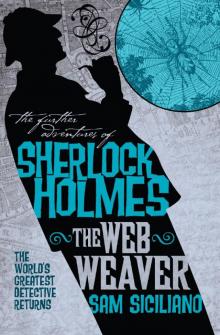 The Web Weaver
The Web Weaver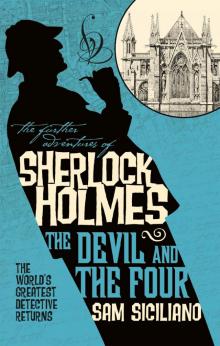 The Further Adventures of Sherlock Holmes--The Devil and the Four
The Further Adventures of Sherlock Holmes--The Devil and the Four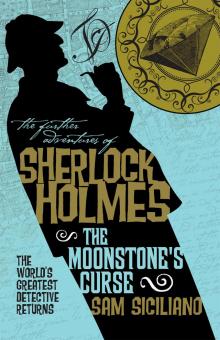 The Moonstone's Curse
The Moonstone's Curse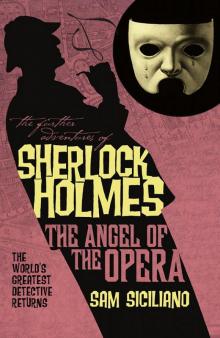 The Angel of the Opera
The Angel of the Opera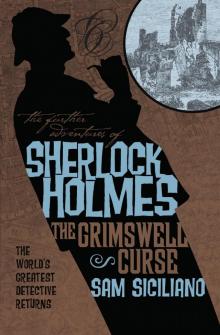 The Grimswell Curse
The Grimswell Curse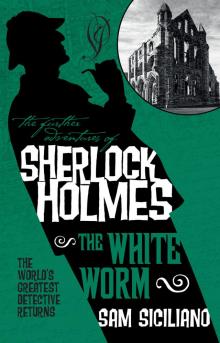 The White Worm
The White Worm